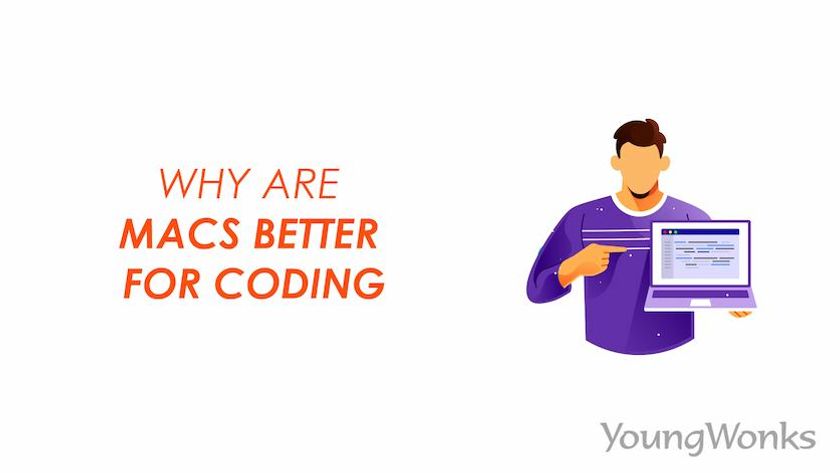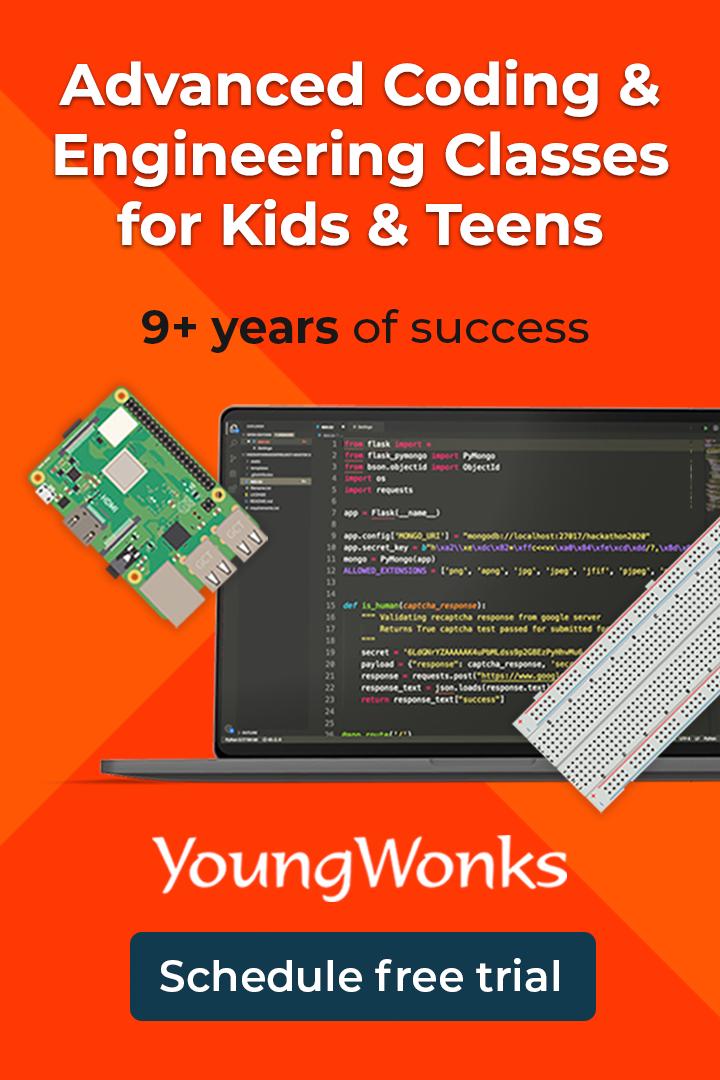Oct 28, 2024 By Team YoungWonks *
In the world of software development, one of the most common debates among programmers, tech enthusiasts, and computer science students is whether Macs or Windows PCs are better for coding. This question has sparked discussions across online forums, coding bootcamps, and professional workspaces. Some coders swear by the MacBook Pro for its Unix-based environment and seamless compatibility with development tools, while others argue that Windows laptops offer greater flexibility and affordability. But when it comes to the best laptop for coding, what truly sets Apple products apart?
From its macOS ecosystem to powerful CPU performance and outstanding build quality, the MacBook Air and MacBook Pro are often favored by software engineers and developers worldwide. The command line interface, cross-platform capabilities, and robust development environment make them a compelling choice for professionals working with Python, web development, iOS apps, and more. But how do they stack up against Windows laptops, and what makes your Mac an ideal choice for software development?
This guide dives deep into why Macs have become the go-to machines for many coders, exploring how macOS X, open source support, and Unix-based architecture contribute to an optimized workflow for programmers. We’ll compare Macs and Windows PCs, highlight their strengths and weaknesses, and help you decide which system best suits your coding needs.
Macs: The Powerhouse for Developers
One of the primary reasons MacBooks have become the preferred choice for programmers is the Unix-based foundation of macOS. A Unix-like operating system provides a stable, reliable, and highly secure environment for coding, making it an ideal platform for software development. Many developers who are accustomed to Linux distros like Ubuntu find the transition to macOS smooth, thanks to the similar command-line interface and robust package management system. The macOS terminal supports bash and zsh, allowing developers to execute commands efficiently, debug programs, and automate workflows.
Another standout feature of macOS is its seamless compatibility with a wide range of open-source tools. The ability to install essential software using Homebrew, macOS’s popular package manager, simplifies the process of setting up a development environment. Whether you're working with Python, web development frameworks, or cross-platform tools, macOS ensures a hassle-free experience. Apple’s commitment to providing a smooth user experience extends to the MacBook Pro and MacBook Air, both of which are widely used by coders, web developers, and software engineers alike. More on macOS Terminal can be found in Apple's official documentation.
Beyond the command-line benefits, macOS offers unparalleled integration with Apple products. If you're developing iOS apps, you’ll need Xcode, Apple’s official IDE for iOS and macOS applications, which is only available on macOS. This makes a MacBook Pro or MacBook Air an essential tool for iOS app development. The macOS ecosystem allows developers to seamlessly sync projects across their iPhone, iPad, and Mac, making the workflow more efficient than on a Windows PC.
Hardware and Build Quality
Apple’s reputation for build quality is one of the many reasons MacBooks stand out in the best laptop debate. Whether you choose a MacBook Pro or a MacBook Air, you're getting a laptop engineered with premium materials, ensuring durability and longevity. The sleek aluminum chassis, high-resolution Retina display, and cutting-edge trackpad technology make working on a Mac an enjoyable experience. Compared to many Windows laptops, including premium models like the Dell XPS, Apple’s MacBook lineup consistently delivers better functionality and performance for developers.
One of the most critical aspects of a developer’s laptop is the CPU performance and battery life. The transition from Intel processors to Apple’s custom M1 and M2 chips has significantly boosted efficiency, offering faster compiling times and improved power management. Whether you're working on a resource-intensive virtual machine, running multiple IDEs, or testing an Android app alongside an iOS app, a MacBook Pro can handle it effortlessly. Unlike many Windows laptops, which often struggle with battery life, MacBooks are optimized to last all day, allowing developers to work uninterrupted.
Moreover, Apple’s trackpad is widely regarded as the best in the industry. It provides precision control, making tasks like coding, debugging, and UI/UX design smoother compared to most Windows PCs. With a Unix-based system, superior build quality, seamless cross-platform integration, and robust hardware specs, MacBooks continue to dominate the world of software development.
Compatibility with Development Tools
For iOS apps, a Mac is essential. Xcode, Apple’s integrated development environment (IDE), is exclusive to macOS and is required to build applications for the iPhone, iPad, and other Apple devices. Additionally, developers can install and manage software efficiently using Homebrew, a package manager designed specifically for macOS.
Cross-Platform Capabilities and Virtual Machines
A significant advantage of macOS is its ability to run Windows, Linux, and other operating systems through virtual machines. This is particularly useful for developers who need to test their applications across multiple platforms. Tools like Parallels and VirtualBox make cross-platform development seamless.
Mac vs. Windows: Which One Should You Choose?
The decision between Macs and Windows laptops ultimately depends on your specific needs as a coder. Here’s a closer look at how they compare in key areas:
- Operating System and Development Environment: Macs run macOS X, a Unix-based system that provides a powerful command line interface similar to Linux. This makes it an excellent choice for developers who rely on bash, Python, and other scripting tools. Windows, on the other hand, requires additional configuration to create a similar development environment, though WSL has improved this significantly.
- Software and Compatibility: For iOS apps and macOS development, MacBooks are the only choice, as Xcode is exclusive to Apple’s platform. However, Windows PCs offer greater flexibility for Android development, gaming, and working with Microsoft technologies like .NET and Visual Studio.
- Hardware and Performance: When it comes to build quality, Apple leads the way. The MacBook Pro and MacBook Air are built with premium materials, offering excellent durability and battery life. Windows laptops, while often cheaper, vary greatly in build quality, depending on the manufacturer. Unlike Windows PCs, which can suffer from driver issues and unexpected updates, macOS remains consistent and stable. The operating system is optimized for Apple’s hardware, ensuring that everything from the trackpad to software updates just works without interruptions.
Why Developers Choose Macs
One of the biggest reasons developers favor MacBooks is their Unix-based nature. Mac OS X (now macOS) shares many similarities with Linux, making it an ideal platform for running open-source tools, managing command line workflows, and using bash for scripting. The macOS development environment supports a broad range of programming languages, including Python, JavaScript, Swift, and Ruby, making it a top choice for web development, software engineering, and cross-platform applications.
For developers working in the Apple ecosystem, MacBooks are almost a necessity. If you're building iOS apps for iPhones, iPads, and other Apple devices, you’ll need Xcode, Apple's official IDE for developing iOS apps. Since Xcode is exclusive to macOS, developers interested in creating apps for the App Store will find the MacBook Pro or MacBook Air indispensable.
Another reason Mac users prefer Apple devices is their exceptional hardware quality. The MacBook Pro offers high-performance CPUs, efficient battery life, and a Retina display that enhances the coding experience. The trackpad on a Mac is considered one of the best, providing a smooth, responsive experience for software engineers working long hours. MacBooks are also known for their superior build quality, often outlasting many Windows laptops in durability.
Final Verdict: Is Mac or Windows Best for Coding?
When it comes to coding, MacBooks are the best choice for most developers. Their Unix-based macOS, superior build quality, security, and seamless integration with development tools make them the preferred option for professionals. While Windows laptops offer affordability and customization, they lack the stability, security, and long-term reliability of a Mac.
For iOS and macOS development, a Mac is an absolute necessity. For web development, AI, and general programming, macOS provides a smoother and more efficient experience. Unless you have a specific requirement for Windows, choosing a MacBook for coding is the smartest investment for any programmer
*Contributors: Written by Kabir Pandey; Edited by Disha N; Lead image by Shivendra Singh

